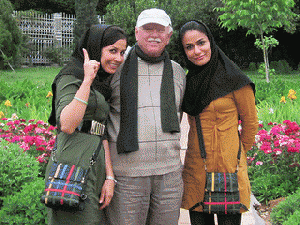The theocratic Shia-Mullah regime of Iran is the wellspring of radical jihadi terrorism in the Middle East and flowing throughout the world. A few Shia-Mullahs with absolute power in Iran and control of hundreds of billions of dollars are imposing their perverse version of Islam on everyone they can, transforming the world as their power grows stronger.
Everyone agrees that the Shia-Mullah regime in Iran must go. There is a way that the Iranian people themselves can bring about a peaceful regime change. But what form of government should replace the mullahs?
Americans naturally would answer, "Democracy!" Yet even the most patriotic American would admit that in recent years America's Democracy has devolved into Plutocracy. Step by step, the grossest forms of corruption have been legalized so that a few billionaires and rich special interests control America, regardless of the will of the people.
History has shown the drawbacks of various forms of government. Among these failed systems are Theocracy, or the rule of mullahs; Autocracy, whether a king or queen, or an absolute dictator; Oligarchy, or rule by a few people; Plutocracy, or rule by the rich. None of these consider the needs, desires and will of the people.
Democracy, in the American ideal, is supposed to mean that a majority of the people rule, but the rights of the minority are respected and protected. The ideal as expressed by Abraham Lincoln is "government of the people, by the people, and for the people." Sadly, in one way, today's American Democracy and the "democracy" in Iran are similar: everyone has the opportunity to vote for candidates who are hand-picked by the rich or powerful few.
What Iran needs is a purer, uncorrupted form of democracy which I call "Zerocracy", where the government simply works for the people, implementing policies affirmed by a strong majority, without the corrupting influences of money, ideology, parties, and always protecting the rights of everyone. When the Shia-Mullahs step down or are removed, Iranians will have the opportunity to create their own destiny, with a new government serving to fulfill the will of the people.
Zerocracy combines pure democracy with inviolable human rights including economic rights, an economic plan to achieve prosperity and economic security for all Iranians. Zerocracy is based on the precept that the purpose of government is to improve the lives of all of the people and to provide the maximum opportunity and economic security for everyone.
Here's how Zerocracy is a better form of democracy for Iran.
Under the Bill of Rights for all Iranians, which will be affirmed by the people as part of the process of regime change, no private money is allowed to be spent in politics. No political groups or parties may spend money or advertise in any way. While absolute freedom of religion is guaranteed, no clergy may stand for public office. No Sharia Law or other religious dogma is allowed.
Candidates for office must specify their goals and submit a clear plan to achieve them. All candidates receive equal and random space in the print media, and equal time on electronic media. Two primary elections will narrow the choice to five or less for each office. Voting is mandatory.
The economic plan that is submitted for approval by the people is designed to support the economic rights of Iranians, including a job with sufficient pay to provide a home, education, health care, and a secure dignified retirement and old age.
All of this is possible and practical because the plan is based on the concepts of Zero Cost Economics.
These principles are simple common sense. You don't need to be an economist to understand Zero Cost Economics. Yet these simple concepts are overlooked by conventional economic models--Keynesianism, Monetarism and Marxism. Every economic model practiced to date has failed to achieve lasting prosperity and economic security for everyone because they all end up serving the needs of a few and ignoring the interests of the vast majority of people.
Zero Cost Economics says that costs always rise faster than incomes, and it continue to rise regardless of your income situation. Whether you are a household or a national economy, even rising incomes cannot keep pace with rising costs. At the household level, costs of all kinds eventually surpass income. If you are a government, eventually you either increase debt, or raise taxes, and either way the people suffer even higher costs.
So, Zero Cost Economics says you can accumulate much more wealth, for a person or a nation, by reducing costs than you can by raising incomes.
Unlike other economic models, Zero Cost Economics points out the difference between wealth-creating and wealth-consuming activities. When people build or manufacture something, this creates wealth, or value. When they sell stocks or charge interest and fees, these costs consume wealth.
To be sustainable, an economy must create more wealth than it consumes.
Fortunately, when a person works at a wealth-creating job, the person creates more value than it costs to pay him or her. Therefore, the real cost of creating that job is ZERO.
Zero Cost Economics also says that jobs that reduce costs create the most value of all. This is understandable, because when you do something today that reduces costs permanently, eventually the result pays for itself many times over.





